This page contains affiliate links. Please read our disclosure for more info.
Many people are surprised that Cuba is not a cheap country to travel in. The average Cuban salary is around $25 a month after all, and travellers expect prices similar to those in Central America. But as we’ve said, Cuba is unlike anywhere else we’ve visited and you can’t expect things to be that straightforward.
Cuba has a dual currency system: Cuban pesos (CUP) or moneda nacional are what locals earn/spend while convertible pesos (CUC) are what tourists spend and locals need for any kind of luxuries. 1 CUC is about equivalent to US$1, and 1 CUC buys 24 CUP. Tourists can use moneda nacional for a few things like street food which is very cheap but everything else (accommodation, transport etc) must be paid for with convertibles. It sounds confusing but you get the hang of it once you are there.
Cuba Travel Costs
Here’s what we spent during our two weeks in Cuba visiting Havana, Vinales and Trinidad. These costs are for two people.
Currency: GBP
| Country | Total Spent | Days in country | Cost per day |
|---|---|---|---|
| TOTALS: | £1,440.25 | 25 | £57.61 |
| Cuba | £1,440.25 | 25 | £57.61 |
| Country | Accommodation | Food | Transport | Entertainment | Other | Total Per Day |
|---|---|---|---|---|---|---|
| Cuba | £16.31 | £16.15 | £17.31 | £7.15 | £0.69 | £57.61 |
Currency: USD
| Country | Total Spent | Days in country | Cost per day |
|---|---|---|---|
| TOTALS: | $2,189.18 | 25 | $87.57 |
| Cuba | $2,189.18 | 25 | $87.57 |
| Country | Accommodation | Food | Transport | Entertainment | Other | Total Per Day |
|---|---|---|---|---|---|---|
| Cuba | $24.79 | $24.55 | $26.31 | $10.87 | $1.05 | $87.57 |
This is the breakdown of how much this works out on an average daily basis.
We budgeted £70 a day which is about US$110 or 110 CUC for two people so we were pretty happy that we came in under budget at £58/ $88 a day or £29/ $44 per person. I doubt we could travel for that on any other Caribbean island.
Accommodation
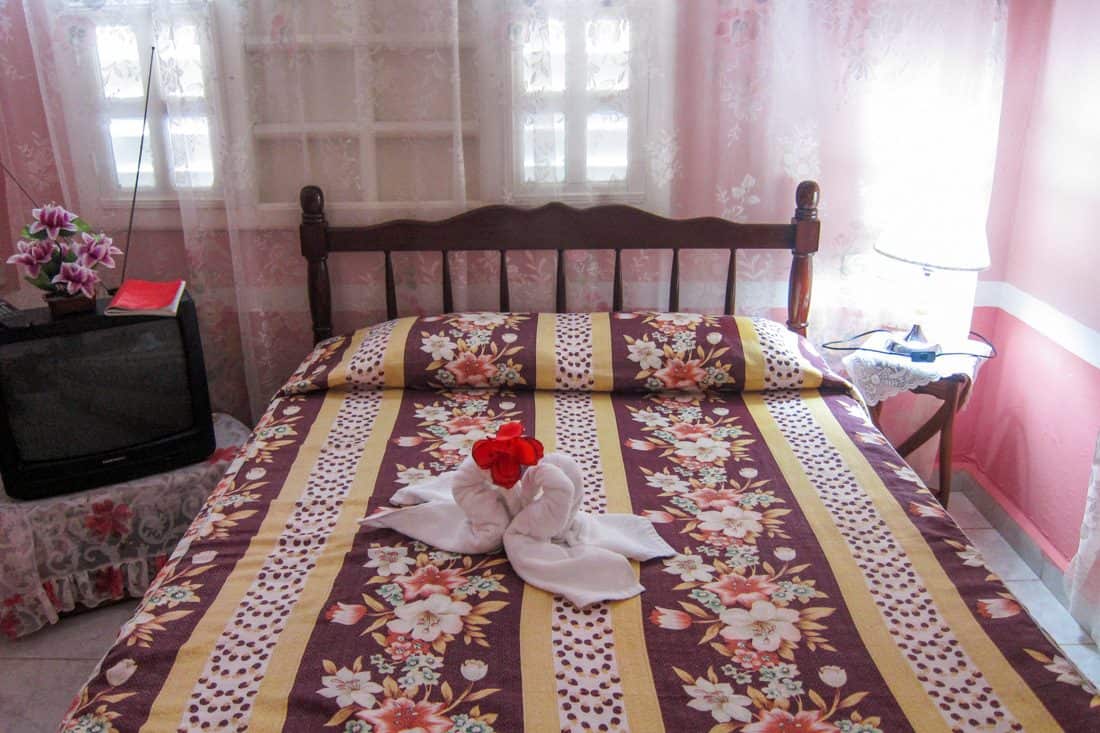
- We stayed entirely in casas particulares or homestays where Cuban families rent out one or two rooms in their homes. They are cheaper than the government-run hotels and you get the benefit of the wonderful hospitality and home-cooked meals. We paid between 20-30 CUC per room which were always clean, simple but comfortable, and equipped with private bathroom, hot water, A/C, and often a fridge.
- As the price is per room accommodation costs are higher for solo travellers.
You can now book homestays online on Airbnb with rooms from $10 a night—sign up here for $39 of your first stay.
Food
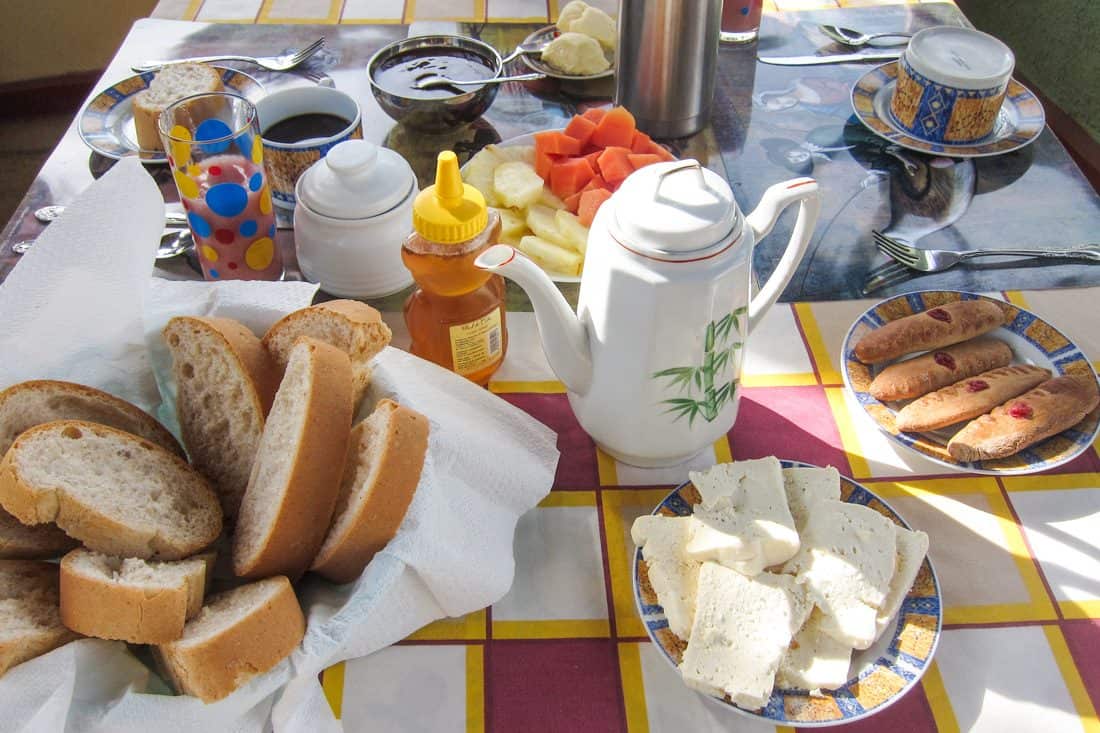
- We ate in our casas for most meals. Breakfast was 3-5 CUC each and dinner was 7-8 CUC each—portions are huge. We also ate peso pizza from street stalls for about 10 CUP ($0.42).
- Bottled drinking water is included in this category and was a substantial expense—we spent £50/$76 on water, but we do drink a lot of it.
Transport
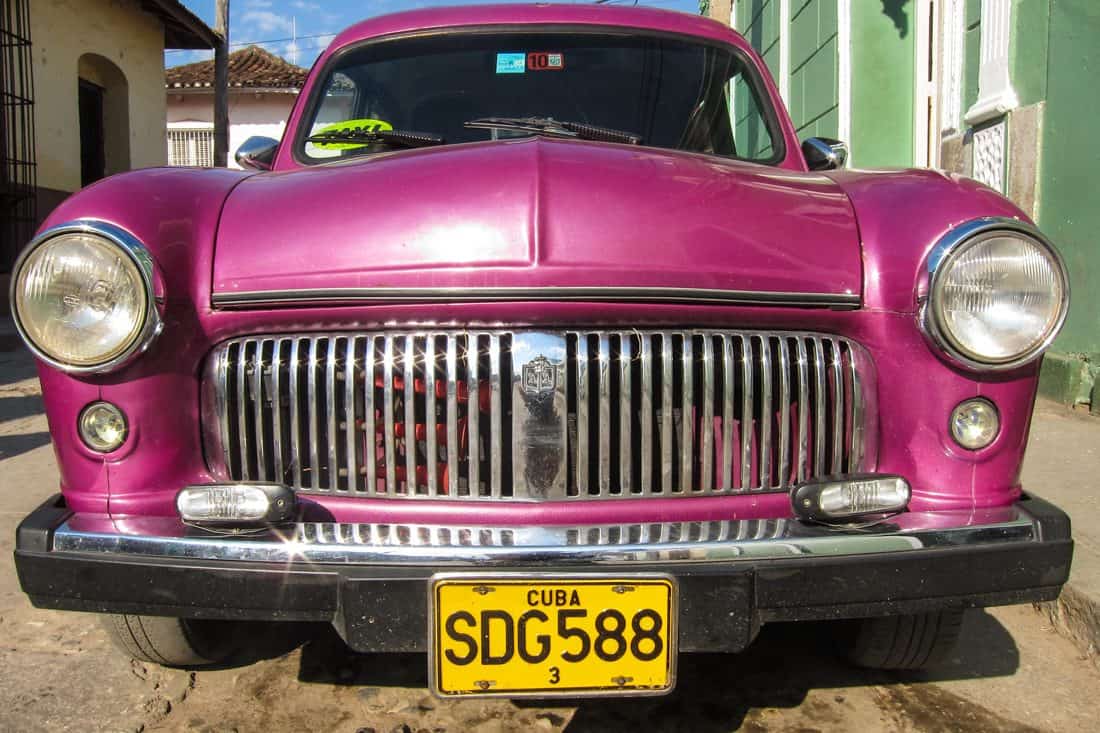
- We travelled by comfortable Viazul bus between cities (12-37 CUC for 4-9 hour trips).
- A taxi from the airport into Havana is 25 CUC.
- We paid US$25 each for a Cuban visa at Cancun airport.
- Exit tax from Cuba is 25 CUC.
Entertainment
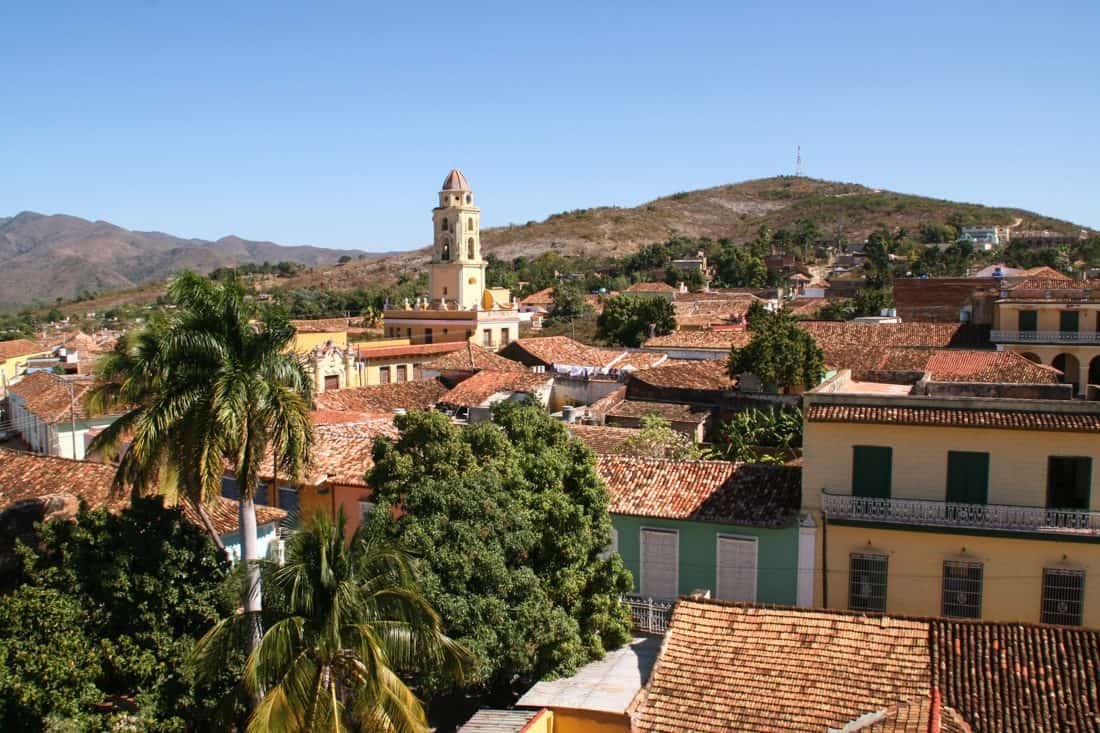
- This includes a few nights out seeing bands, two private salsa classes, horse riding, and entrance fees to museums and galleries.
- We only drank alcohol a few times so if you plan to drink a lot of mojitos (2-3 CUC each, more in Hemingway bars) this category will be higher.
Miscellaneous
- This includes laundry and tips, often for the bathroom attendant. Tips are a must in Cuba as locals rely on them for access to convertibles.
Other Costs Not Included Above
- Our return flights from Cancun to Havana with Cubana cost US$282 each.
- Don’t forget travel insurance—we use and recommend True Traveller for UK/EU citizens. Heymondo is another reliable option available worldwide.
Things to Know About Money in Cuba
The money situation in Cuba is more complicated than in other countries so you’ll need to be prepared before you arrive.
- There are some ATMs in big cities in Cuba but your card won’t work if it’s issued by an American bank. Although our British bank card may have worked the ATMs can be unreliable so we decided to take all our money in cash.
- Outside of big resorts credit cards aren’t commonly accepted. We didn’t use ours.
- As we were travelling from Mexico we took all our cash in Mexican pesos. Other good currencies to take are Euros, British pounds, and Canadian dollars. US dollars have a 10% exchange rate penalty so it’s best to avoid them.
- Only change some of your money at the airport when you arrive as rates are better in Havana.
- We used one of the cadecas (change booths) to change money from Mexican pesos to convertible pesos. The one we used was at 257 Obispo in Habana Vieja.
- We also changed 20 CUC (convertible pesos) to CUP (Cuban pesos or moneda nacional) which we mostly spent in street food stands on peso pizza. This was actually quite a lot for two weeks as Cuban pesos go far and can’t be used for many items.
- Prices in the Lonely Planet Cuba guidebook were surprisingly accurate, even though our guide book was an older version published in 2009 (the latest version is 2015).
For more Cuba tips see our post on planning a trip to Cuba and our travel resources page.
If you enjoyed this post, pin it!
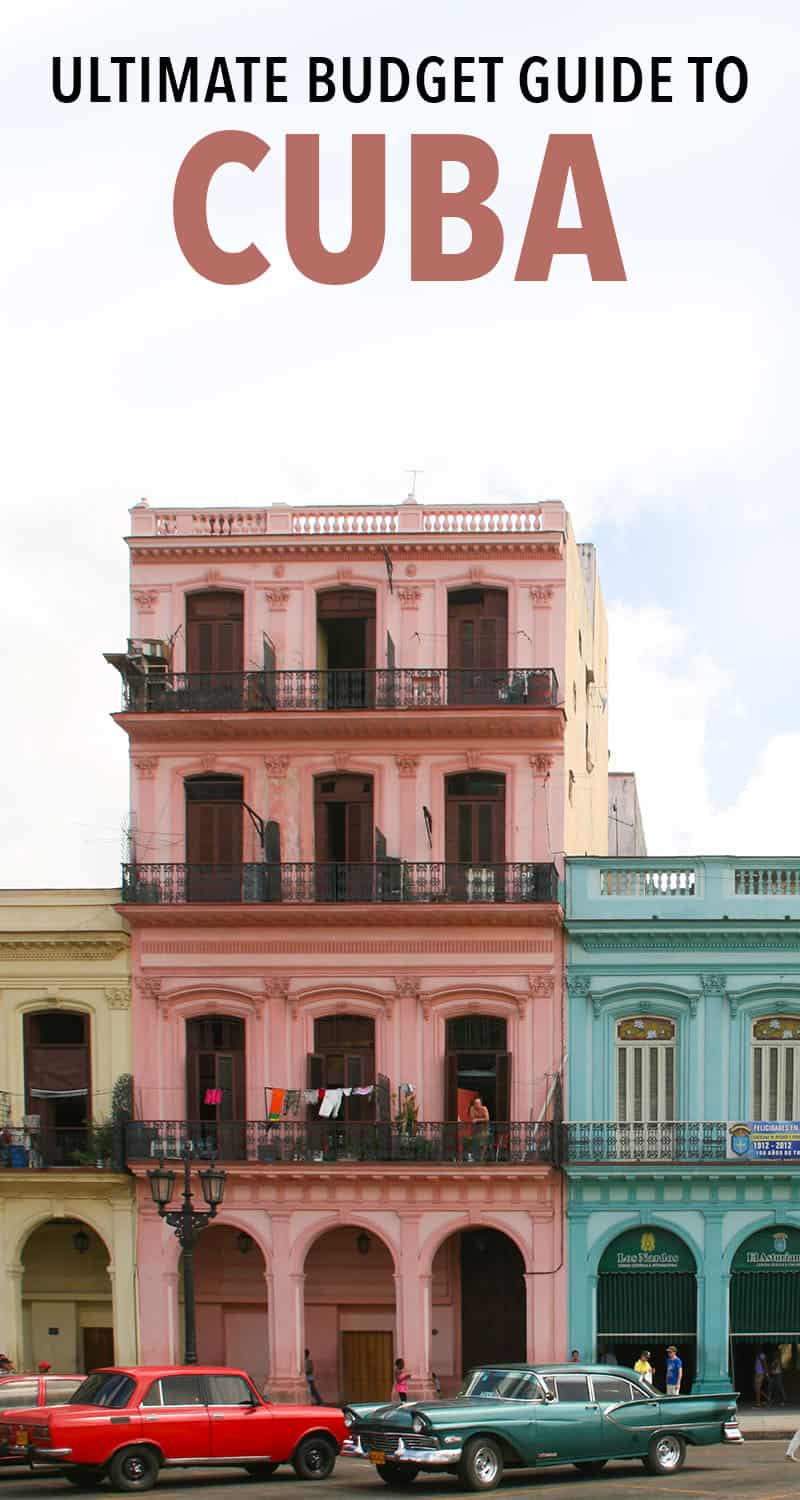
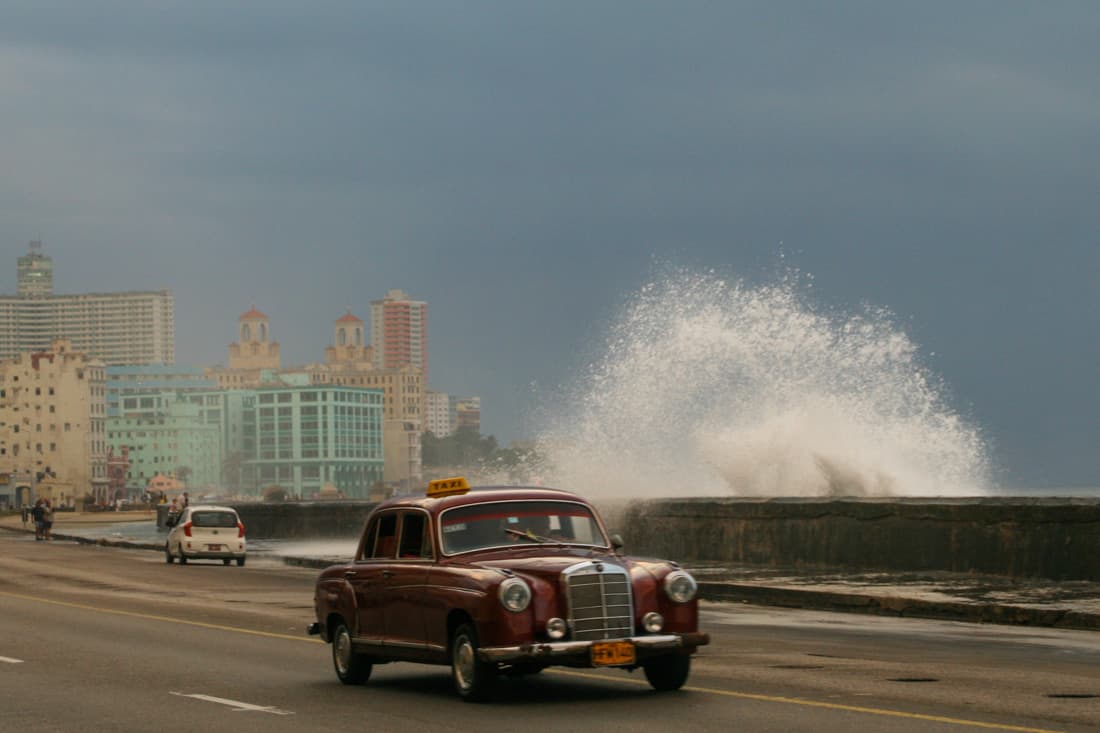
If Cuban’s can survive on $25/month then why can I, as a visitor, do the same? It is not as if I have “Rich Westerner to be fleeced” tatooed on my forehead (and anyway I might be Western European, but I am not rich). Surely I can convert my cash to the local currency and pay the same prices as they do?
they get food staples via ration card free
Lovely country Cuba. I missed the Habana and Trinidad a lot. If I have not been to Cuba, I think I would be so surprised with this post. You expect Cuba being extremely cheap place to visit, but it’s absolutely not. Thank you for the great tips with excellent photos.
Hello,
Can you please tell me how you found the accomodation in private houses? Did you book in advance, or just landed and looked for accommodation when there? I’ll be travelling with two children, we are keen to save money and not spend too much on fancy hotels, so staying with failies would be great, but I’m not sure where to start! Thank you!
I’ve written about it here: http://www.neverendingvoyage.com/planning-a-trip-to-cuba/
Thank you so much for your website . I try to learn as much as i can from your information. i have two weeks after new year on January 4 to 16 would you mind highlight the city i worth to travel , also the casa who has good reputation i can trust and help me in Cube. i want to contact with them , then book my ticket . Thanks again.
God bless you.
Jenny
This post should help: http://www.neverendingvoyage.com/planning-a-trip-to-cuba/
thank you for the info about cuba. ( I would like to travel to cuba from san Francisco u.s.a what would be the best way to do this ? also how much do 3 star hotels charge ?
You could fly via Mexico City or Cancun. I don’t know about hotels as we stayed in homestays. You can read more about them here: http://www.neverendingvoyage.com/planning-a-trip-to-cuba/
Erin,
Maybe a silly question but when you booked your flight, did the airline give you any hassle? I know that you obviously booked it through an airline outside the US but I’m curious if the airlines show any type of interest or give any type of hassle. Thanks for your posts.
We had no problems (but we’re not from the US). We know many other Americans who’ve travelled there via Mexico and had no problems either.
Hey there, thank you so much for sharing all the details of your trip, it has been very useful during the planning of my trip to Cuba. I am currently in Mexico and so was thinking about taking Mexican pesos and changing them for CUCs in Cuba. However, i’ve read on a few websites that Mexican pesos have the second worst exchange rate behind USD. So I don’t know whether I should change my pesos to pounds, Canadian dollars or Euros in Mexico and then change those to CUCs in Cuba.
I’ve used the rates quoted on the banco de Cuba website and when I convert from Mexican pesos to EUR, GBP or CAN and then to CUCs I get pretty much the same answer as converting straight from Mexican pesos to CUCs.
My question is although you exchanged Mexican pesos directly to CUCs, did you notice that you would have got a better deal converting from another currency (EUR, GBP or CAN) instead?
Thanks so much for any help you can give me. I’m so excited to have an experience like yours!! I’m going in 3 days now!!
We looked into it and it wasn’t worth changing pesos into another currency first.
Yeh, that’s what i’m thinking too. Thanks so much for your quick reply :)
Hi could you give me details of your trip and costs, thanks
Hi, I’m going to Cuba and would like to stay at a casa paticulare. How do I get in touch with people who rent out their rooms to know the price they charge but also to know more about it… Is there a casa you recommend that is safe?
– Ylfa
The details are in this post: http://www.neverendingvoyage.com/planning-a-trip-to-cuba/
Very informative. i recently went, legally, with a Roads Scholar/Elder Hostel group. The guides were wonderful, university quality. I have a Cuban stamp on my passport. Roads Scholars was expensive, but half the price of some of the other groups.
I had ample time to practice español and Cubans are more difficult to understand than Mexicans, verdad. However, after a little it was OK. Lots of people in our group had no español and that was no problema! Several in our group were fluent, alot better than me, so it all worked out.
I recommend going with a group, such as ours, and then branch out and go however. I have travelled and lived in Latin America and still found Cuba to be different and extremely interesting.
Gracias a todos y vaya a Cuba!!!
Appreciate the response.
I may be wrong but common sense serves CUP is for Cubans, whilst the tourists buy CUC with their £, €, $, ¥ to pay for shelter, sustenance and souvenirs.
Casas are private enterprises, hence profit oriented as rest of the world.
“1 CUC=12 CUP”
So, do casa particulares charge the tourists same as the natives? Guess they don’t.
A 25 CUC rent may be paid in CUP, but it has to be 25×12, right?
[sorry if any of this sounds stupid, for we have to plan in Ruppee and fares for five to half the world away are bringing the jews out of us]
You have to pay for accommodation, transport and tours in CUC but you can change money to CUP and use it in the simple street stands and shops to buy snacks (like pizza, sandwiches) and drinks.
Hello! Thanks for sharing a first hand experience.
An India here, fantasising a visit.
Havana via Heathrow seems to be one of the few options.
Can you suggest a cheaper detour?
As an Indian, guess I can’t help thinking as a cheapstake–can local people or owners of Casa Particulares be befriended so I can avail the benefits of CUP and those cheap beers? You know like scratching each others back? Is it even legal if possible?
Thanks.
Tourists can use CUP to buy things in local shops/restaurants, it’s not illegal.
I’m not sure where would be cheaper than London. Maybe try Spain. Or use skyscanner.net and see which options it gives you.
Thanks for such an informative article guys! So helpful for our Cuba planning. We’ll be there in May and am SO EXCITED!
Hi! This was excellent info and is very helpful in our planning! We are going to Cuba in the end of Jan. 2014 and are very excited!! :) So thanks for your very useful information about costs in Cuba!!
Best regards.
p.s. some questions from readers sure are interesting…about law and rental car… :)
obviously you are not a tourist information… ;)
Hi great info guys Thanks. Dat will help us on our trip to cuba in December. First time in Cuba. What do u reccomend we should go see & where, & cheapest way to get there?
This post should help: http://www.neverendingvoyage.com/planning-a-trip-to-cuba/
Hi! great breakdown! I think best i found till now :) just to clear things, your budget of 70sterling a day was for 2, so it was 35sterling per person? If so I must say a pretty good budget. When did you visit Cuba? Was it in summer?
thanks
Yep that’s right although we spent less than our planned budget at £29 per person per day. It’s cheaper for a couple to travel though because of accommodation costs. We were there in March 2013.
My father is from Cuba and he came here 16, and I really would like to visit. But with all the laws changing, would he even be able to go over there?
I’m not sure on the laws for Cubans I’m afraid.
Alana Quedrida,
I recently went to Cuba with a Roads Scholars group. Wonderful experience.
I believe that you, as a descendent of a Cuban, now have special status. Cuban Americans can go with much more facility than non-Cuban Americans. Cubans want everyone to visit, especially you, who may still have family there.
Vaya a Cuba. They need the business,
Abrazos,
Emily Patch
Portland, OR
{
Hi
Thanks for the article.
Great tips.
Do you have any idea how much would it cost to rent a car for 10 days?
Including gas and insurance.
Thanks
Steff
Hi Erin
Thanks for all the info. I am at the very start of planning a trip to Cuba. I have pretty much zero knowledge of Spanish and my wife just slightly above zero. Do you this will make travelling by bus and staying in homestays difficult? I like to avoid big hotels and tourist traps but am worried our lack of Spanish may make things difficult/impossible!
Thanks for your help
Stephen
Take a phrasebook and give it a go and you’ll be fine. A couple staying at our homestay didn’t speak Spanish and the owner didn’t speak English but they managed to communicate with hand gestures and a few words and got on fine. Good luck!
Hi guys
Everyone recommends taking loads of cash but I haven’t read anything about ‘security’ whilst carry all this cash around or leaving in hotels. Are there some tips you have for avoiding being ripped off and are tourists targeted for mugging given that people must know they carry ‘lots of cash’?
Thanks
Julie (just considering a trip right now)
We did what we usually do with our cash when travelling. On travel days we have it under our clothes in a money belt, and when we are staying somewhere we leave it locked inside our bags when we’re out and about. We stayed with Cuban families in casas particulares and felt very safe.
I don’t think tourists are targeted at all for mugging. The crime rate is quite low and we felt safe there. The government wants to attract tourists so would crack down on any crime against them. Apparently most thefts are when tourists do stupid things like leave their wallet and cameras on a table while they get up to dance. If you are sensible about it you should have no problems.
hey there quick question,
I am going to be in Cuba for 2 weeks but only two of those days I will be free to roam and eat. How much does food cost for a sit down place? How much does beer run? and last but not least any idea on how much trinkets and such might be. Was shopping expensive? I live in the US so how does it compare to lets say a nice scarf as a gift for someone, or some sorta memory item. I am thinking I should only take about 200 for both those days where I will be spending my own money.
Also should I get the exit fare out when I arrive or can I do that when I go to leave? ( the 25 dollar exit fee).
Do you know if you can take 2 suitcases or just one?
We actually didn’t eat in restaurants and it really depends what restaurant you go to. A beer can be a few dollars. We didn’t do any shopping so I don’t know prices. There is lots of local artwork that looks great.
$200 should be plenty for those two days, although maybe take a bit extra in case you find more things you want to buy. Bear in mind you’ll get charged an extra 10% exchange fee for dollars so you might want to bring euros or Canadian dollars to change. Make sure you leave 25 CUC for the exit tax.
The exit fee can be paid when you leave. You’ll have to check with your airline about the suitcases.
Have a great trip!
Hi, just enquiring about Australian Dollars…. guessing they don’t take them…. Thx
I don’t think so. They aren’t listed on the bank site:
Dear NEV,
Can you please advise on below or anything at all to ease my mind?
From reading all other notations I gather it is easier and less “hit” to exchange Euros, rather than USA dollars, Euros into CUC’s is less expensive? Allowed only $179.00 USA dollars and $3,000.00 family assistance flying in with World Atlantic.
I am thrilled traveling to Cuba (August 10 thru 19-2013) for the first time since my departure at 10 years old.
I already have a rented car and a house at the beach in Havana, BUT any recommendations and/or cautions are welcomed. Specially to where to buy “viveres” groceries while in Old Havana? I am of fair skin and the sun has me worried and sincerely the heat, planning to stay hydrated with plenty of water, BUT I do tend to perspire and “menopause hot flashes”. Bathing with cold water not a problem, mainly avoiding heat during the day and hot while sleeping,,, any ideas please. What about mosquitoes precautions –taking mosquitoes’ net?
Back in 1976 when I left I remember “Apagones” light going off for long periods of time each day, any truth to that improving?
Packing my free 44 pounds of clothes and food, free 22 pounds of medicine (is the 3 ounce liquid-rule the same to medicines, medicines go free but as carry-on and if more than 3 ounces is it still good to carry meds?) , purse and an 8 pound laptop and honestly as any Cuban knows I am blessed if returning with clothes I have on and purse, everything else even my personal items will remain in the island and much needed by my family.
MapQuest is not helpful with local addresses: looking for distance from: Havana between Compostela and Luz, and to: Calle 132 between 249 & 134, Rio Verde, La Colonia 25336?
I am a collector by heart, world currency and would like to bring back anything other than wood figurines,,, any ideas?
My family, aunts, uncles, cousins await and God Willing our reunion to honor HIS name!
Thank you,
Barbara Grant
Hi Barbara
I don’t know the answers to all your questions but here’s what we do know.
Taking euros to change will cost you less than dollars which get a 10% extra charge.
We didn’t have any problems with power cuts, and every house we stayed had A/C so that will help with the heat. Wearing a hat, drinking lots of water, and avoiding being out in the middle of the day should help. We didn’t have problems with mosquitos but take some repellant just in case, I doubt you’ll need a net.
It’s best to ask the airline about the medicine.
We found Google Maps good for Havana so look up directions there in advance and print them off before you go.
Have a great trip!
Erin
i wanna know more about cuba a room apartment monthly
I’m afraid I don’t know.
AirBnB
Hi there.
Fab post – thank you.
Can I ask… Did you simply turn up in each place and find accommodation or did you pre-book any of it? Thinking of heading there next year so this post was very helpful.
Cheers
We booked our first place online and then they booked the next place for us a day in advance (with their friend/family). It was so easy. I’ve written more about that here: http://www.neverendingvoyage.com/planning-a-trip-to-cuba/
Hi from Coggeshall in Essex,
We are off to Cuba in a few days and the series of posts brings together a lot of ideas, places ad things we have been talking about.
Great pics, great post.
Thanks
Excellent -have a great trip!
Great guide for what to expect in Cuba. Hoping to get there sooner than later. Some good points to think about and consider here! :)
Could I bother you with a couple of quick cash question – you came in with peso and changed where at the airport?
Did you happen to notice if they change a lot of currencies? We’re currently in Honduras and will be going to cuba via Grand Cayman so the only cash we’ll be able to get is either Honduran Lempiras, Grand Cayman dollars or US dollars.
Thanks for all the Cuba info – it’s invaluable. As someone already said, there really isn’t much about – not about the every day details.
This is the bank website and I think these are the only currencies they change:
You might have to take dollars and take the 10% hit, or maybe try to change your money in Honduras into Euros or something. Have a great trip!
Thanks guys – that’s super useful.
I went to Havanna and Varadero in 2005 and even then prices were quite steep. As I was on an organized tour I was staying in hotels all the time. I love the sound of the casas particulares though. What a great way to get to know a country!
I really don’t think we would have had anywhere near as good as an experience staying in hotels, plus it saved us money.
As an American, I wouldn’t risk it. If something does happen, then what?
We are Americans and travelled to Cuba illegally, flying into Havana and back from Cancun with absolutely no problems. From all I have read no American has ever been prosecuted for travelling illegally to Cuba and the US government is simply not interested in pursuing this ridiculous situation. Upon entering the US we simply said we had been in Cancun (true) and that was it. Most all the Americans we met in Cuba had done something similar. Entering legally is just a huge rip off with “educational” trips being super expensive and overpriced.
It’s really a little more complicated than you say it is and the penalty is steep. Things change, especially if Republicans win the election – the door could close again – tomorrow. Why chance it? $300 to return to Cancun, illegally? $600. is what it costs from Miami and back legally. There must be a reason they want you to keep your trip itinerary, etc for the net 5 years. I’m just saying, is it worth it?
Love the details.
I wish it is easier for us Americans to visit Cuba. The regulations in place is completely and utterly unnecessary.
I agree although we know a lot of Americans who visited pretty easily by flying from Mexico.
Great article! Thanks for all of the detailed information. I love the idea of staying and eating in casitas. I’m planning to head to Cuba within the next year and this will be a great resource (along with your awesome article of random observations).
Thanks Peggy. We have some more tips to come so hopefully those will help with planning your trip.
I could love to travel with you ..
The accommodation looked good and the food looked plentiful, sounds like you guys had a great time. We’ve been using your trail wallet app (even come up with a new verb: to trail wallett something – meaning to add an expense to Trail Wallett, we’re thinking of shortening it to ‘To Twallett something’) while travelling round New Zealand and Australia, very useful, thanks for designing it!
Haha! We say things like “Did you trail wallet that?” too but I like the idea of shortening it. Glad you’ve found the app useful!
Yes, I would have assumed Cuba to be similar in terms of cost as other Central American countries, so this is good to know. The money situation sounds like a pain, and actually sounds quite similar to the current situation here in Argentina, except that US dollars here are coveted like gold!
I’m Cuban American and I’ve been there several times to visit family. Its been 13 years since I was there last because the rules did change for us BUT i have been courious on how much and how it was for others. Great article, thanks.
Really useful post, in fact all of your posts on Cuba have been as there doesn’t seem to be that many out there. Its somewhere that we plan to go to but just readng up on the money side of things, just led to confusion and the vintage cars were prettier to look at anyway! Its good to know how much to budget, so we can work this into our total trip budget. I think I’ve finally got it now…Thank You!
It does seem confusing at first but it isn’t all that bad. The main thing is to take lots of cash with you and don’t rely on ATMs. You could get away without spending pesos at all, and just spend convertibles, but it’s nice to eat at the more local places and save some cash.